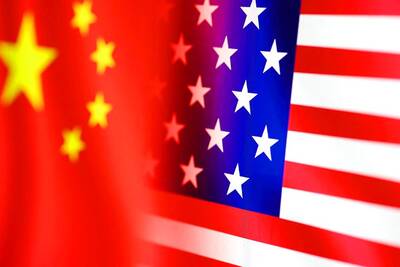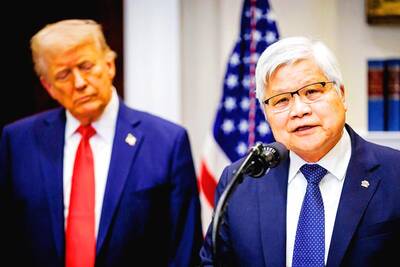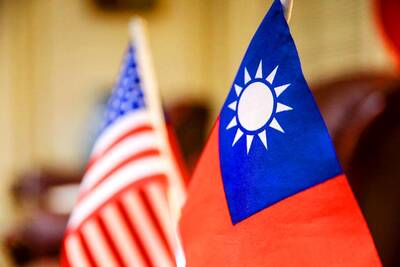Prosecutor-General Huang Shih-ming (黃世銘) can rest easy now after the Control Yuan yesterday failed again to impeach him over his role in the “September strife” scandal sparked by efforts to oust Legislative Speaker Wang Jin-pyng (王金平) from the Chinese Nationalist Party (KMT) and therefore his at-large legislative seat.
After reportedly intense discussions, 12 Control Yuan members voted 6-6 in a closed-door meeting on an impeachment motion against the prosecutor-general.
Control Yuan probe committee members Hung Te-hsuan (洪德旋) and Wu Feng-shan (吳豐山) submitted the motion shortly after their first impeachment motion was voted down on Nov. 28 last year by a 5-5 decision.
Control Yuan regulations stipulate that an impeachment vote requires a clear majority to be passed and a tie amounts to the defeat of the motion.
An impeachment motion also cannot be initiated against an official on the same charges more than twice.
The Control Yuan met on Dec. 10 and Dec. 19 last year to try to bring the motion to a vote. The first meeting was adjourned because there was not a quorum, while members refused to vote on the motion during the second meeting because they said the motion’s investigative report was incomplete.
The motion stems from allegations that Huang leaked classified information about an ongoing investigation by briefing President Ma Ying-jeou (馬英九) on Aug. 31 and Sept. 1 last year on the Special Investigation Division (SID) probe into allegations of improper lobbying by Wang.
Huang also allegedly showed Ma the transcript of a telephone conversation between Wang and Democratic Progressive Party (DPP) caucus whip Ker Chien-ming (柯建銘) that came from a wiretap.
Reports that the division had tapped Ker’s telephones triggered a scandal following revelations that the legislature’s switchboard had also been bugged in the process.
Huang previously promised to step down before his term expires in April should he be impeached by the Control Yuan or found guilty of leaking classified information in the first trial of a case brought against him by the Taipei District Prosecutors’ Office on Nov. 1.
After wrapping up a two-month investigation, the Ministry of Justice Prosecutors’ Evaluation Committee on Dec. 14 recommended that Huang be dismissed for leaking information to Ma.
However, since it usually takes six months for a verdict to be handed down in the first trial of a case, which, along with the failure of the impeachment motion, could mean Huang would be able to complete his term.
While DPP lawmakers were sharply critical of the Control Yuan after yesterday’s vote, KMT legislators were divided on the result.
The public has lost faith in the Control Yuan, which has apparently forgotten its constitutional duties and its reason for existence, DPP Legislator Wu Ping-jui (吳秉叡) said.
DPP Legislator Wu Yi-chen (吳宜臻) said the result was unexpected, particularly given that Huang’s alleged wrongdoings had also been “confirmed” by the ministry’s “neutral” committee.
“Vetoing the motion is tantamount to being an accomplice to Huang. We may as well dissolve the Control Yuan,” she said, urging the government to revise the threshold for impeachment of officials.
KMT caucus whip Lin Te-fu (林德福) said he respected the vote, adding that there was no point impeaching Huang, given he only had three months left in the job.
However, KMT Legislator Chen Ken-te (陳根德) said Control Yuan members had acted against public opinion to keep their own jobs.
“Even if they were to be nominated again for Control Yuan membership, their nominations would require our [the legislature’s] seal of approval. Do they really think they will have our support after we find out they have voted against the motion?” Chen said.
Huang refused to comment on the results of yesterday’s vote, as did the SID and Wang.

‘CROWN JEWEL’: Washington ‘can delay and deter’ Chinese President Xi Jinping’s plans for Taiwan, but it is ‘a very delicate situation there,’ the secretary of state said US President Donald Trump is opposed to any change to Taiwan’s “status quo” by force or extortion and would maintain that policy, US Secretary of State Marco Rubio told the Hugh Hewitt Show host on Wednesday. The US’ policy is to maintain Taiwan’s “status quo” and to oppose any changes in the situation by force or extortion, Rubio said. Hewitt asked Rubio about the significance of Trump earlier this month speaking with Taiwan Semiconductor Manufacturing Co (台積電) chairman C.C. Wei (魏哲家) at the White House, a meeting that Hewitt described as a “big deal.” Asked whether the meeting was an indication of the

‘RELATIVELY STRONG LANGUAGE’: An expert said the state department has not softened its language on China and was ‘probably a little more Taiwan supportive’ China’s latest drills near Taiwan on Monday were “brazen and irresponsible threats,” a US Department of State spokesperson said on Tuesday, while reiterating Washington’s decades-long support of Taipei. “China cannot credibly claim to be a ‘force for stability in a turbulent world’ while issuing brazen and irresponsible threats toward Taiwan,” the unnamed spokesperson said in an e-mailed response to media queries. Washington’s enduring commitment to Taiwan will continue as it has for 45 years and the US “will continue to support Taiwan in the face of China’s military, economic, informational and diplomatic pressure campaign,” the e-mail said. “Alongside our international partners, we firmly

KAOHSIUNG CEREMONY: The contract chipmaker is planning to build 5 fabs in the southern city to gradually expand its 2-nanometer chip capacity Taiwan Semiconductor Manufacturing Co (TSMC, 台積電), the world’s biggest contract chipmaker, yesterday confirmed that it plans to hold a ceremony on March 31 to unveil a capacity expansion plan for its most advanced 2-nanometer chips in Kaohsiung, demonstrating its commitment to further investment at home. The ceremony is to be hosted by TSMC cochief operating officer Y.P. Chyn (秦永沛). It did not disclose whether Premier Cho Jung-tai (卓榮泰) and high-ranking government officials would attend the ceremony. More details are to be released next week, it said. The chipmaker’s latest move came after its announcement earlier this month of an additional US$100 billion

COUNTERING THE PLA: While the US should reinforce its relations with partners and allies, Taiwan must invest in strengthening its defenses as well, Phillip Davidson said If influence in the Indo-Pacific region is one of the US’ core interests, then Taiwan serves as a cornerstone of US economic and security influence in the region, former US Indo-Pacific Command commander admiral Phillip Davidson said on Thursday. “China’s ... strategy is to supplant the US leadership role in the international order ... and they’ve long said ... that they intend to do that by 2050,” Davidson told the National Review Institute’s Ideas Summit in Washington. Davidson said he had previously told US Senate hearings on China’s military activities and possible threats in the Indo-Pacific region that a Chinese invasion of